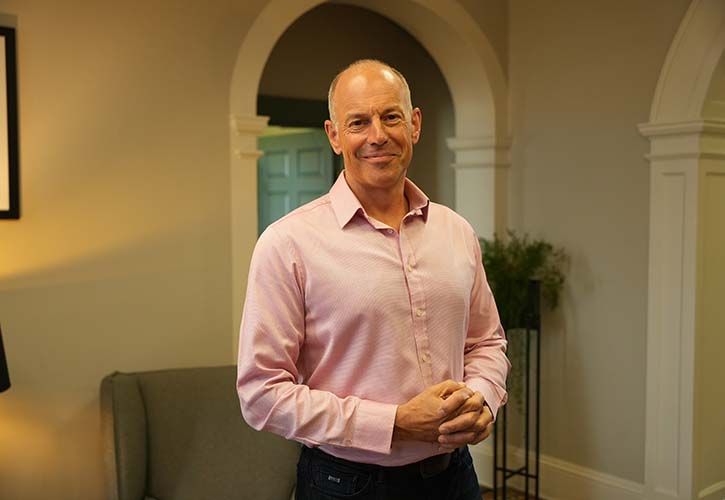UK DIY News
Wickes And Phil Spencer Talk Saving Money On Energy Bills

- Energy bills set to soar this winter: average household facing £149 increase[1]
- Phil Spencer teams up with Wickes to share valuable energy-saving advice based on 30 years of buying, selling and renovating – from low-budget to longer investment opportunities
- Home improvement retailer, Wickes partners with Solar Fast to become the first UK retailer offering installation when shoppers purchase solar panels
The latest energy forecasts paint a bleak picture for consumers, with household energy bills predicted to skyrocket this winter. The average household using a typical amount of gas and electricity can expect to pay £1,717 a year from October - a significant jump from the current annual bill of £1,568[2].
As energy bills reach record highs, and to mark the launch of their new partnership with Solar Fast, Wickes has conducted a new study that reveals the extent of the energy affordability crisis gripping the nation. A staggering 44% of Brits already find their energy bills too expensive, with 16% saying they can’t even afford to use the amount of energy they really need*.
To help combat this concern looming over homeowners, Wickes has teamed up with TV property guru Phil Spencer [pictured above], to reveal steps to take to reduce energy bills in the short term and longer-term investments that can add value to your home and even earn you money back.
Phil Spencer says: “Energy is one of the top costs of running a home and it can be difficult to know where savings can be made. Simple tips like switching off lights and not leaving electricals on standby are some of the quickest and most effective ways to reduce costs. At the same time, higher investment items like solar panels could be the secret to saving hundreds of pounds each year in the long term.”
Phil’s ‘do it now’ low-budget energy saving tips:
1) The heat is on
Doors and windows are some of the most common areas to suffer from draughts. Help contain heat and boost the effectiveness of your central heating by investing in draught excluders for as little as £6. Better yet, getting in a professional to draught proof can save around £35 a year.
Another solution is topping up insulation. Insulation rolls that have a thickness of 200mm or above, or those with a 100mm thickness can be combined with existing insulation to boost effectiveness. Topping up your loft insulation from 120mm to 270mm can save up to £19 a year and 55 kg of carbon dioxide emissions while installing cavity wall insulation could save you up to £210 a year[3].
2) Switch it off
Turning off your lights when not using them could save you around £7 on your annual energy bills and avoid 6 kg of carbon dioxide emissions a year[4]. An even easier way to save is by replacing your regular bulbs with LEDs. Switching out just six halogen spotlights with an LED equivalent could save £23/year and 24 kg of carbon dioxide emissions a year[5].
3) Keep above water
The cost of water is also a growing concern for Brits. Opt for a water-saving shower head to reduce water usage by up to 50% without compromising performance. Doing so can save a typical household up to £25 off their gas bill, and £35 off their water bill each year[6]. It’s one of the easiest switches homeowners and renters can make to save money on bills.
Phil’s ‘think ahead for the future’ tips:
1) Invest in solar
Of those who have considered installing a renewable energy solution, more than half (58%) say they would most likely opt for solar, though almost 65% of those surveyed who haven’t yet installed a renewable energy solution say they could be discouraged by upfront costs*.
While they are an investment, it’s one worth making if you can. Solar panels can supply your home with energy, with no risk of price hikes from suppliers. Not only do they reduce your bills and carbon footprint, but solar panels can also help to increase your home’s EPC rating when combined with other energy saving solutions. Research suggests increasing an EPC rating from an F to a C could increase a home's value by up to 15%, while raising an EPC from a D to a C could see an increase of 3%.[7]
If homeowners are interested in taking this step, Wickes has partnered with national solar panel installer Solar Fast. Solar Fast has an ‘Excellent’ rating on TrustPilot and their solar panels are offered with a 25 year guarantee. Offering swift installation and aftercare, Solar Fast’s knowledgeable installers will be on hand to answer any questions you may have to ensure a solar installation that suits your needs, budget and preferences. The Solar Fast team will also show you how an app that you can install on your phone will help you track your energy generation and export.
2) Persist and you will be rewarded
Solar panels could last for up to 30 years when maintained correctly. You can even be paid for excess electricity you feed back to the grid if you have an agreement with the government’s Smart Export Guarantee scheme[8]. Introduced in 2020, the scheme is a great way to make money from your solar panels, but Wickes’ recent survey found more than half of Brits aren’t aware the programme exists. To shorten payback time on your excess energy, it's best to shop around for the best paying tariff.
3) Maintenance is key
To get the most out of your solar panels, regular cleaning is essential to maintain efficiency and durability. Ensure you call in a professional to do this to avoid damaging the panels or putting yourself in danger.
Getting power from any kind of daylight, and with temperatures between 15 and 30 degrees Celsius optimal for performance, the UK provides ideal conditions for solar energy. But with the UK being no stranger to inconsistent weather, solar panel owners should ensure they regularly inspect for any signs of damage with professional annual inspections to ensure panels are operating safely as well as keeping them in tip-top condition.
With a mission to help property owners save money, reduce their carbon footprint and reap the rewards of reliable energy, Wickes Solar is here to bring you quality solar panel installations at competitive prices.
For more information and a free quote, head to Solar Panel Installation | Wickes Solar, or for more quick and easy energy-saving solutions explore the interactive Wickes Energy Efficient Home.
[1] Changes to energy price cap between 1 October to 31 December 2024 | Ofgem
[2] https://www.ofgem.gov.uk/energy-price-cap#:~:text=Between%201%20October%20to%2031,on%20typical%20household%20energy%20use.*Survey conducted August 2024, based on 2,062 respondents.
[3] Energy Saving Trust July 2024 savings for a gas-heated semi-detached house - Topping up from 120 to 270 mm is £19 per year saving, 55 kg CO2e. If installing loft insulation where there is none (0 to 270mm) then saving £200 a year and 600kgCO2e. Cavity wall insulation can save £210 and 650 kg CO2e a year. Professional installation only recommended.
[4] Energy Saving Trust July 2024 - Turning off your lights when you don’t need them could save you around £7 on your annual energy bills and avoid 6 kg of carbon dioxide emissions a year
[5] Energy Saving Trust July 2024 - The most common non-energy efficient bulb in homes is halogen spotlight/downlight. Switching out 6 50W halogen spotlights with LED equivalents could save £23/year and 24kgCO2e.
[6] Energy Saving Trust July 2024 - The £60 saving is a verified fact for a typical household from Energy Saving Trust. Households could save £25 off their yearly gas bills and £35 off their metered water and sewerage bills by replacing their inefficient shower head with a water efficient one, if a 9.82 litre a minute shower head is replaced with a 7.7 litre a minute shower head.
[7] A home improving from an EPC rating of D to C, could see an increase in value of 3%, or £11,157. While moving from an F to a C rating could increase the property’s value by an average of an additional 15%, or almost £56,000, when looking at the current national average asking price.
rightmove.co.uk/guides/content/uploads/2023/07/Rightmove_Greener_Homes_Report_2023.pdf
[8] Subject to eligibility https://www.ofgem.gov.uk/environmental-programmes/smart-export-guarantee-seg/generators
Source : Wickes
Image : Credit - Move iQ
Insight DIY is the only source of market information that I need and they always have the latest news before anyone else.











































